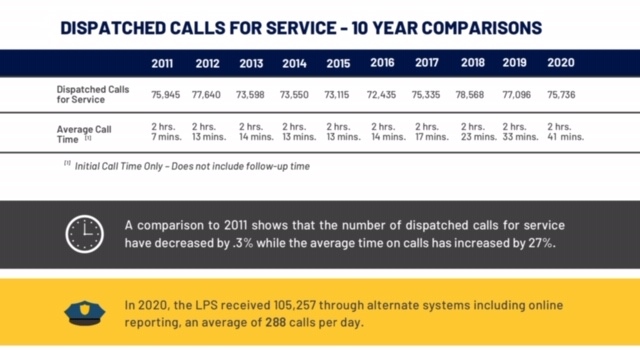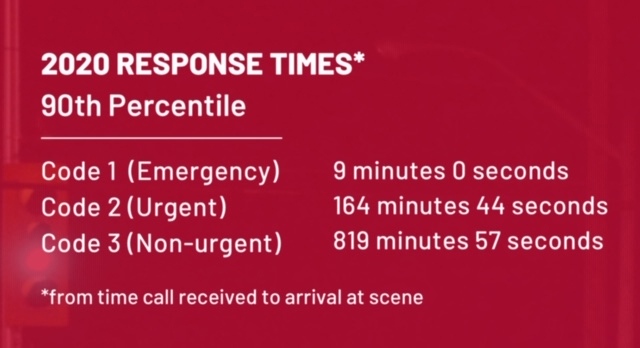How long you can expect to wait for police in London on the rise
Police response times are suffering in London as officers face increasingly complex calls for help.
On Thursday, the London Police Services Board received the 2020 Annual Report on policing, including average response times to 911 calls.
The highest priority calls (Code 1), life-threatening emergencies, now take an average of nine minutes between calling 911 and the arrival of a police officer.
Urgent calls of a non-life-threatening crime in progress now takes two hours and 44 minutes on average, and the response to non-urgent calls averages over 13-and-a-half hours.
“That’s very valuable time. Evidence, life and health are at risk,” says Rick Robson on behalf of the London Police Association (LPA), the union that represents officers.
Deputy Chief Stuart Betts told the police board that response times reflect the rising complexity of policing.
“The nature of the calls has changed,” explained Betts. “The complexity has increased, and it's part of an overall increasing degree of complexity in the justice system.”
Since 2011, the average time spent on each police call has risen 27 per cent, to two hours and 41 minutes.
 (Source: 2020 Annual Report to London Police Services Board)
(Source: 2020 Annual Report to London Police Services Board)
(Source: 2020 Annual Report to London Police Services Board)
The LPA says the situation is taking a toll on officers.
“Our officers are burning out,” admits Robson. “They cannot continue to go significant call to significant call and continue to have 50 to 100 calls waiting in the queue for them.”
The nine-minute response for “lights and siren” emergency calls represents the time between a 911 call is placed and an officer arriving on scene, including two minutes and thirty-five seconds (average) that the caller speaks to an operator before police are dispatched.
 (Source: 2020 Annual Report to London Police Services Board)
(Source: 2020 Annual Report to London Police Services Board)
(Source: 2020 Annual Report to London Police Services Board)
Unlike fire and ambulance service, there is no target for police response times.
Betts says in part that’s because police are dispatched from vehicles in the field rather than neighbourhood stations.
Betts and Robson agree that speeding up response times will require system-wide change.
“Unless there is a change from police being the front line for mental health and other social ills, the only other answer is more resources,” says Robson.
“Quite frankly, adding more officers will make an impact, but it won’t make a defining impact,” explains Betts. “There are more things we can do like adding technology that will allow us to be in the right place at the right times.”
CTVNews.ca Top Stories

Harvey Weinstein's 2020 rape conviction overturned by N.Y. appeals court
New York's highest court on Thursday overturned Harvey Weinstein's 2020 rape conviction, reversing a landmark ruling of the #MeToo era in determining the trial judge improperly allowed women to testify about allegations against the ex-movie mogul that weren't part of the case.
BREAKING Honda to get up to $5B in govt help for EV battery, assembly plants
Honda is set to build an electric vehicle battery plant next to its Alliston, Ont., assembly plant, which it is retooling to produce fully electric vehicles, all part of a $15-billion project that is expected to include up to $5 billion in public money.
MPP Sarah Jama asked to leave Ontario legislature for wearing keffiyeh
MPP Sarah Jama was asked to leave the Legislative Assembly of Ontario by House Speaker Ted Arnott on Thursday for wearing a keffiyeh, a garment that is banned at Queen’s Park.
CTE: Researchers believe widespread brain injury may contribute to veteran suicide rate
Researchers are working to better understand if some Canadian military veterans may be suffering from Chronic Traumatic Encephalopathy, also known as CTE -- a disorder previously found in the brains of professional football and hockey players after their death.
1 arrested in northern Alberta during public shelter order
Residents of John D'Or Prairie, a community on the Little Red River Cree Nation in northern Alberta, were told to take shelter Thursday morning during a police operation.
Secret $70M Lotto Max winners break their silence
During a special winner celebration near their hometown, Doug and Enid shared the story of how they discovered they were holding a Lotto Max ticket worth $70 million and how they kept this huge secret for so long.
Remains from a mother-daughter cold case were found nearly 24 years later, after a deathbed confession from the suspect
A West Virginia father is getting some sense of closure after authorities found the remains of his young daughter and her mother following a deathbed confession from the man believed to have fatally shot them nearly two decades ago.
New deep-water channel allows first ship to pass Key bridge wreckage in Baltimore
The first cargo ship passed through a newly opened deep-water channel in Baltimore on Thursday after being stuck in the harbor since the Francis Scott Key Bridge collapsed four weeks ago, halting most maritime traffic through the city's port.
First in Canada procedure performed at London, Ont. hospital
A London man has become the first person in Canada to receive a robotic assisted surgery on his spine. Dave Myeh suffered from debilitating, chronic back pain that led to sciatica in his right now and extreme pain in his lower back.





























